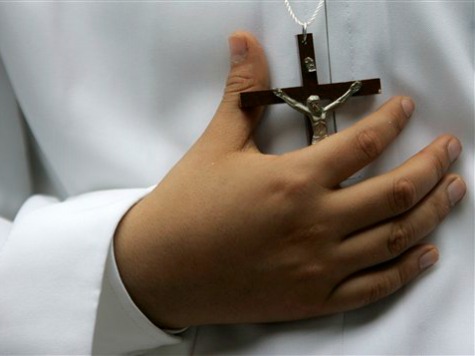
The Catholic bishop of Dallas preached a homily Sunday in Washington D.C. to an assembly that included a majority of the sitting justices of the Supreme Court. Bishop Kevin Farrell’s sermon couched the topic of immigration reform and amnesty in language that espoused welcoming “the stranger in our midst,” as it also criticized the polarized atmosphere in the nation’s capital, urging respect rather than “petty partisanship.”
According to the Washington Times, attending the Cathedral of St. Matthew for the annual “Red Mass,” celebrated for judges, attorneys, law school professors and students, and government officials, were Chief Justice John Roberts and Justices Antonin Scalia, Anthony Kennedy, Clarence Thomas, Stephen Breyer, and Elena Kagan. The Red Mass is traditionally held on the Sunday prior to the first Monday in October, the opening day of the Supreme Court’s annual term.
Farrell’s homily stressed the Church’s commitment to the poor and to immigrants. Though he did not specifically mention the term, “immigration reform,” Farrell spoke out about the need to embrace newcomers to this country. In his sermon, he used the Shrine of the Sacred Heart in Washington D.C. as an example of a parish that “welcomes”:
The parish also does what so many parishes do today. They welcome the stranger in our midst in new and ever-changing circumstances. The immigrants who built the church building and the immigrants who populate the church today had and have different needs. The languages spoken are many, and it is from the many languages that we and they offer praise and thanks to God for life, liberty and the pursuit of happiness on these shores. There may be many languages spoken on the Fourteenth Street corridor but there is among so very many a common purpose; many languages yet a common purpose to better themselves and the lives of their families and the nation where they have made their home. The history of our nation is a living proof of this common goal.
Referring to the polarized atmosphere in the nation’s capital, Farrell called upon the Holy Spirit to bring divided politicians together.
“Petty partisanship and ever-politicizing rhetoric should have no place at all when men and women of goodwill come together to serve the common good,” he said.
While stressing the importance of prayer for “wisdom, clarity, insight, and, yes, unity,” however, Farrell also added:
Please notice that I did not say uniformity. I deliberately said unity because the Holy Spirit is the source of unity on all that matters and the source of variety in and among the differences we have that make us who we are.
It also means that we can and should debate, refine positions, truly listen to each other and seek consensus on essentials and respect details that may well be different. The history of Catholicism is that there is a kaleidoscope of figures in our theological tradition to which we can turn and on whom we rely for a history of evolving and ever refined theological ideas and statements in our teaching called the magisterium.
Channeling recent remarks made by Pope Francis in Rome, Farrell said the Church must be cautious not to be critical of those who do not accept its teachings, and applied this warning to politicians in Washington:
We believe in the dignity of each and every human being made in the image and likeness of God. We may disagree. But there can be no place for derision or smugness. Especially at this time of particular polarizations, we need to be reminded that we Catholics have every right to register what we believe in the public square and do it with pride and conviction. However, in a pluralistic society, we also need to be respectful of those who do not agree with or follow our teachings.
“E pluribus unum means just that,” Farrell said in reference to the phrase, “Out of many, one,” on the Seal of the United States. “It does not mean one size fits all. And it does not mean ‘I Did It My Way’ has replaced the national anthem.”

COMMENTS
Please let us know if you're having issues with commenting.